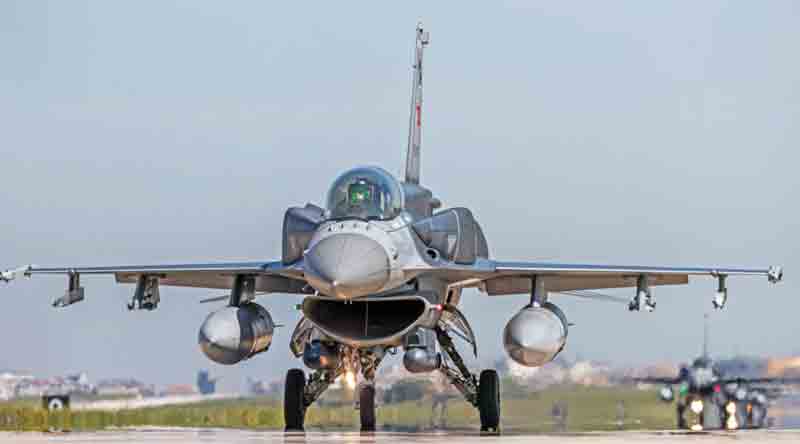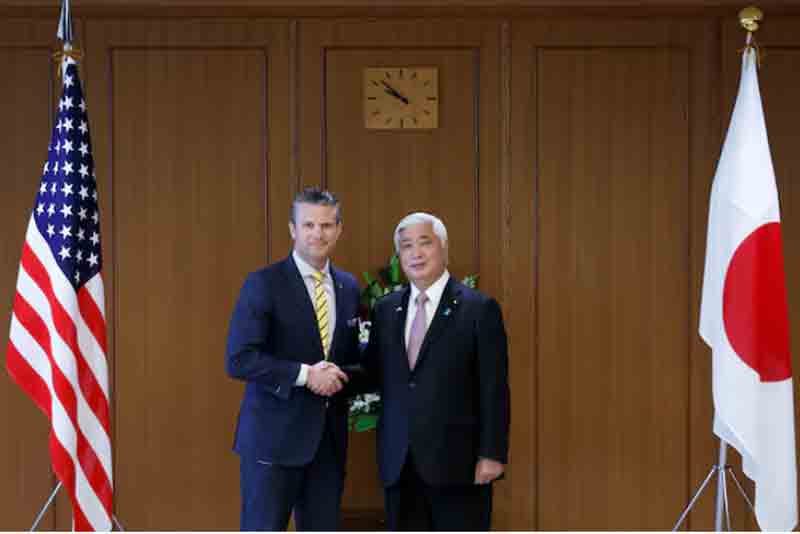Israeli military officials are expressing concerns regarding Turkey‘s potential establishment of a presence at air bases in Syria, as reported by a senior official from the Israeli Defense Forces (IDF) to The War Zone. This statement comes amid Ankara’s discussions for a security agreement with the new government in Damascus, raising alarms about a possible conflict between Israel and Turkey.
The source, who requested anonymity to discuss sensitive military issues, stated, “The creation of a Turkish Air Force base in Palmyra, Syria, could escalate regional tensions and heighten the risk of conflict with Israel. Given Israel’s ongoing efforts to thwart hostile military entrenchment in Syria, any notable Turkish military presence, particularly in strategic areas like Palmyra, could be viewed as a threat to Israeli security interests.”
The official acknowledged that while the likelihood of a direct confrontation between Israel and Turkey is currently low, the situation in the already unstable region could change rapidly. He also mentioned that Israel had recently targeted some of these bases.
“Israel has conducted airstrikes against military infrastructure in the area, including the T-4 airbase near Palmyra,” he noted. “Although there have been no direct clashes between Israeli and Turkish forces thus far, the situation remains delicate and warrants careful observation.”
According to the Times of Israel, the strikes aimed at “remaining strategic military capabilities” at the two locations. The publication further reported that “the airstrikes were executed after the Israeli Air Intelligence Group—part of the Israeli Air Force’s intelligence unit—monitored weapons and other strategic assets at the two military sites in central Syria over the recent period.” The damage inflicted was described as “extensive,” effectively neutralizing capabilities that are crucial for maintaining Israel’s aerial dominance in the region.
Turkey is reportedly starting to establish a military presence in northern Syria, as reported by the Syrian North Press Agency.
According to the publication, “Turkish forces have initiated the construction of a military base within the Menagh Military Airbase in the northern Aleppo countryside, northwest Syria, in recent days,” citing an unnamed source. “They have begun transporting large concrete slabs and logistical supplies using heavy transport vehicles to Menagh Military Airbase, located about six kilometers south of Azaz, with the aim of setting up an air defense center.”
Turkey aims to transform the airbase “into a fully operational air defense facility, which includes the refurbishment of helicopter landing pads, as part of its strategy to enhance its military footprint in northern Syria,” the North Press Agency reported.
There are also reports suggesting that Turkey is constructing another base in northwestern Syria, close to the town of Manbij.
The relationship between Israel and Turkey has been inconsistent over the years. A potential thaw in relations that began in September 2023 quickly deteriorated due to Israel’s conflict with Hamas. The increasing tensions between the two nations are occurring as both are attempting to assert control over territory in Syria following the downfall of long-time leader Bashar Al Assad in December. The new government formed by Hay’at Tahrir al-Sham (HTS), which received significant backing from Turkey in its opposition to Assad, has not yet achieved complete dominance over the region. In this power vacuum, both Jerusalem and Ankara are striving to expand their influence.
Israel has been expanding its territorial control in the southern region, while Turkey is working to enhance its military presence in the northern, western, and now central parts of the country. Ankara is already supporting various militant factions in Syria that are engaged in conflict with the U.S.-backed Syrian Defense Forces and has conducted airstrikes targeting these groups.
Earlier this month, Turkish President Recep Tayyip Erdogan issued a warning, indirectly referencing Israel, against any intervention in Syria.
“Those who aim to exploit Syria’s instability will not prevail,” Erdogan stated. “We will not permit them to fragment Syria as they envision.”
In the meantime, Israeli Prime Minister Benjamin Netanyahu convened a cabinet meeting earlier this week to address the escalating tensions with Turkey. The Israeli leader aimed to frame a confrontation with Ankara as unavoidable.
In January, an advisory committee to the Israeli government cautioned that Israel should brace for a potential direct clash with Turkey, as reported by The Jerusalem Post. This committee was formed to evaluate defense budgets and strategies.
The committee warned that “Turkey’s aspirations to revive its Ottoman-era influence could heighten tensions with Israel, potentially leading to conflict,” the publication noted.
Compounding these issues is the fact that both Netanyahu and Erdogan are under significant domestic pressure. Netanyahu is currently on trial for corruption, while protests have erupted in Turkey following Erdogan’s imprisonment of the popular mayor of Istanbul, who is his main rival for the 2028 election.
“A senior IDF official suggested that Erdogan might escalate tensions with Israel to garner domestic support,” echoing similar concerns regarding Netanyahu.
Any direct confrontation with Turkey would further burden Israel’s military capabilities.
Alongside its efforts to expand its foothold in southern Syria, Israel has resumed hostilities against Hamas in Gaza following a temporary halt in the conflict that began on October 7, 2023. Recently, the Israel Defense Forces (IDF) targeted the Israeli Air Force (IAF) in Beirut for the first time since the ceasefire. The nation is currently facing attacks from Houthi missiles and has endured hundreds of missile and drone strikes from Iran during assaults in October and April.
While Turkey’s military arsenal is significant, it does not match Israel’s capabilities. Turkey’s inventory includes upgraded F-16C/D fighter jets, advanced drones, effective air defense systems, modern tanks, and long-range artillery. If Turkey establishes operational bases in Syria, its warplanes would be positioned closer to Israel. The introduction of air defenses could create a more challenging environment for the Israeli Air Force in Syrian airspace. These bases, equipped with aircraft and air defense systems, could hinder Israel’s efforts to neutralize the military capabilities of the new Syrian regime.
Moreover, a substantial Turkish presence at these bases would enhance their ability to exert control over extensive areas of Syria. In addition to serving as launch points for aerial operations, these air bases would function as troop garrisons and support proxies independently of ground transportation routes.
A Turkish military expansion in Syria could also complicate U.S. aerial operations, which include airstrikes against ISIS targets and substantial support for the Kurdish-led Syrian Democratic Forces (SDF). The SDF operates in regions of Syria with minimal influence from HTS, and an increased Turkish military presence could bolster Turkey’s allies in those areas.
Nevertheless, in a direct conflict, Turkey would face significant disadvantages. Israel possesses a more advanced Air Force, superior air defense systems, and a highly skilled, technologically advanced military. Additionally, Israel benefits from unwavering support from the U.S., which supplies billions in military aid, weapons, and intelligence to the nation.
Even an indirect confrontation with Turkey could exacerbate Israel’s challenges.
The Alma Research and Education Center in Israel recently pointed out that, similar to the time of significant Russian military presence in Syria, Turkey could adopt various retaliatory strategies beyond merely sending aircraft against Israeli forces. These strategies might involve supplying the Syrians with intelligence on Israeli plans, disclosing information about Israeli operations, and providing advanced conventional weaponry to Syria, particularly in the form of air defense systems, missiles, drones, and more.
Despite the escalating rhetoric, an IDF official indicated that several factors might mitigate the chances of conflict.
The tensions between Israel and Turkey place a crucial U.S. ally in opposition to a NATO member. If a conflict were to arise between Israel and Turkey, it would create a challenging situation for the U.S., which would have to balance its support for both nations. Currently, President Donald Trump has expressed unwavering support for Israel, which could complicate matters for Turkey if a still unlikely clash were to escalate into a broader conflict. A direct confrontation could also jeopardize Turkey’s relationships with other Western allies, the official noted.
Nevertheless, the IDF official remains apprehensive about the future, particularly due to Erdogan’s precarious hold on power.
“I personally believe we are edging closer to conflict, especially with the rise of a radical jihadist regime in Syria and the strong possibility that Erdogan, concerned about his regime’s stability, may opt for escalation despite conflicting interests,” the official remarked. “For him, it could become a ‘do or die’ situation.”
“In summary, there is now a lack of certainty regarding regional stability in the Middle East, or perhaps anywhere else in the world,” he added. “We must continuously monitor the situation and identify, based on security interests, the warning signs that could trigger such an escalation. This vigilance is crucial to avoid being caught unprepared.”
Discover more from Defence Talks | Defense News Hub, Military Updates, Security Insights
Subscribe to get the latest posts sent to your email.





